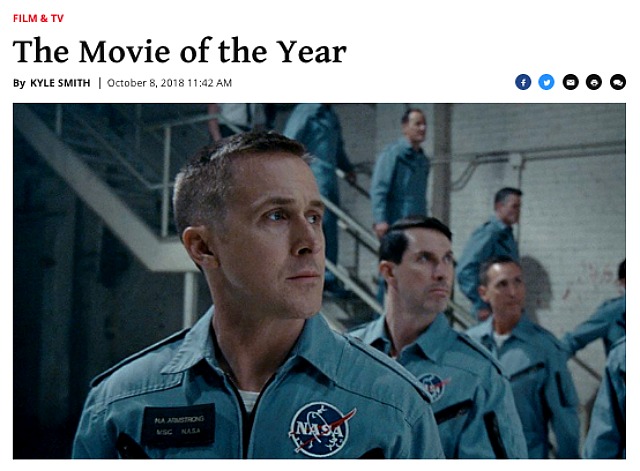Up until yesterday there was some concern that traditional American loyalist types might be cool to Damian Chazelle‘s First Man (Universal, 10.12) because it doesn’t show the American-flag-planting moment on the surface of the moon.
But now that National Review critic Kyle Smith is calling First Man “easily the best film I’ve seen so far in 2018, a standout in everything from the acting to the sound effects,” has this concern about right-wingers dissipated? You might be excused for thinking so. Smith foresees it “earning something like eleven Oscar nominations next winter“…well, all right!

“First Man isn’t overtly a left-leaning or unpatriotic movie,” Smith writes, “but its reserved, interior quality (it actually ends with two people staring silently at each other) is consonant with the tastes of liberals, whose unease with flag-waving is richly rewarded by the film’s omission of the moment when Armstrong plants Old Glory on the Moon.
“Does that choice bother me? Not really. The movie’s focus is simply elsewhere, with overlooked aspects of the mission. Fresh, contrarian approaches to familiar material give First Man so much energy that despite its contemplative character, two hours and 20 minutes pass briskly.”
But hold up there. There are also signs of trouble from certain pockets of left-wing Hollywood culture. First Man isn’t emotional enough, some are saying.
I’m starting to fear, in fact, that despite film festival raves, First Man might do a fast commercial fade with Joe and Jane Popcorn.
A critic friend says “the H-word seems operative here. I know a number of people who say they ‘hate’ it. And I find that beyond baffling, because leaving aside the fact that I love the movie, what’s there to ‘hate’ about First Man?”
All I can figure is that Chazellle’s film operates so closely to the personality of the low-key Neil Armstrong that to some it feels chilly and remote-feeling and a little too tech-heady.
This isn’t a problem for me at all. One thing I really like about First Man is Chazelle’s refusal to do the Ron Howard thing by cutting to wide or establishing shots for standard perspective’s sake. Instead Chazelle keeps us inside the cockpit seat alongside Neil almost the whole time,. All I can figure is that this strategy has made certain viewers feel claustrophobic or something.
“That sounds weird to me,” the critic friend remarks. “I mean, it’s not as if Chazelle doesn’t try to involve you in the lives of Armstrong and his family. It’s a very human drama.”
A female producer friend wrote the other day with a negative reaction. “I was surprised,” she said. “I was expecting to see one of the best movies of the year. But it doesn’t connect, and I could feel a seriously muted audience response. People were kinda grumbling as we shuffled toward the exits.
“It’s actually more than dull — it’s frosty. Neil Armstrong was notably monosyllabic, but the movie is so detached from any sort of emotional currency. It ironically reminded me of Blade Runner 2049. There was Ryan Gosling again, roaming around and furrowing his brow. But never connecting with his universe.
“We also thought Claire Foy was dreadful as the hand-wringing housewife. And Corey Stoll was wasted as Buzz Aldrin with about three snarky lines.
I shared this remark with the critic. “The movie is being attacked on the level of identity politics,” he concluded. “It’s the portrait of a stalwart ’50s straight-arrow white man and his hand-wringing, stand-by-your-man wife. So therefore it must be hated.”
That’s funny, I thought. Straight-arrow white couples in a straight-arrow white movie about NASA space exploration have become objects of scorn and derision because they’re straight-arrow whites.
“I can’t imagine what the filmmakers must be thinking about these reactions,” says the critic. “I guess they’re probably just not going to worry about it. But it will be interesting, this week, to see if critics carry the identity-politics ball on this, in which ‘too cold’ becomes a metaphor for ‘too much in the way of tight-ass straight white guy material.’
“Poor Ryan Gosling! He even got some of this too-white grief for La La Land” — i.e., a white guy can’t be a serious jazz buff.
